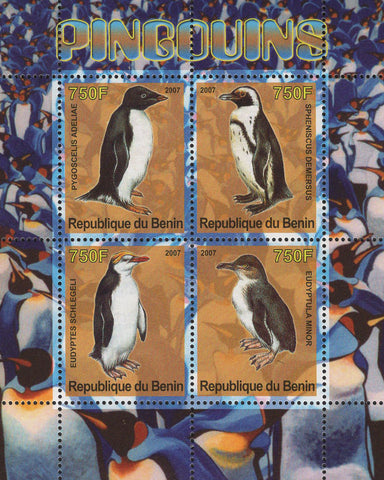Benin Marine Fauna Seagull Seal Ocean Life Souvenir Sheet of 2 Stamps Mint NH
- Product Sku:
- Categories Marine Fauna, Republic of Benin, The Ocean
Benin Marine Fauna Seagull Seal Ocean Life Souvenir Sheet of 2 Stamps Mint NH
Marine life, or sea life or ocean life, is the plants, animals and other organisms that live in the salt water of the sea or ocean, or the brackish water of coastal estuaries. At a fundamental level, marine life affects the nature of the planet. Marine organisms produce oxygen. Shorelines are in part shaped and protected by marine life, and some marine organisms even help create new land.
Most life forms evolved initially in marine habitats. By volume, oceans provide about 90 percent of the living space on the planet. The earliest vertebrates were believed to have appeared in the form of fish, which live exclusively in water. Some of these evolved into amphibians which spend portions of their lives in water and portions on land. Other fish evolved into land mammals and subsequently returned to the ocean as seals, dolphins or whales. Plant forms such as kelp and algae grow in the water and are the basis for some underwater ecosystems. Plankton, and particularly phytoplankton, are key primary producers forming the general foundation of the ocean food chain.
Marine invertebrates exhibit a wide range of modifications to survive in poorly oxygenated waters, including breathing tubes (see insect and mollusc siphons) and gills. Fish have gills instead of lungs, although some species of fish, such as the lungfish, have both. Marine mammals, such as dolphins, whales, otters, and seals need to surface periodically to breathe air. Some amphibians are able to absorb oxygen through their skin.
A total of 230,000 documented marine species exist, including about 20,000 species of marine fish, with some two million marine species yet to be documented. Marine species range in size from the microscopic, including plankton and phytoplankton which can be as small as 0.02 micrometres, to huge cetaceans (whales, dolphins and porpoises), including the blue whale – the largest known animal reaching up to 33 metres (108 ft) in length.[4][5] Marine microorganisms, including bacteria and viruses, constitute about 70% of the total marine biomass.
Fast & Free Shipping within U.S.A.
We Care for your order, Pack it carefully and ship it within 24 hours.
Satisfaction Guaranteed!
Please explore our store for more stamps, souvenir sheets, post-office collectibles and philately books and pre-philatelic items:
montecinos.philately



















